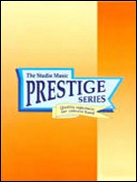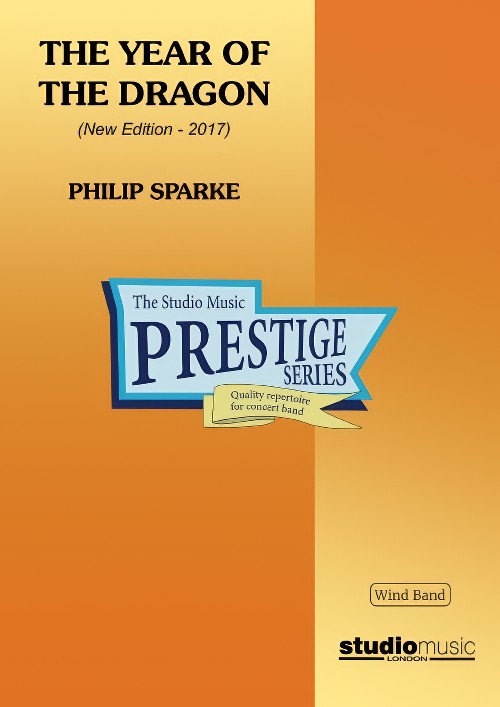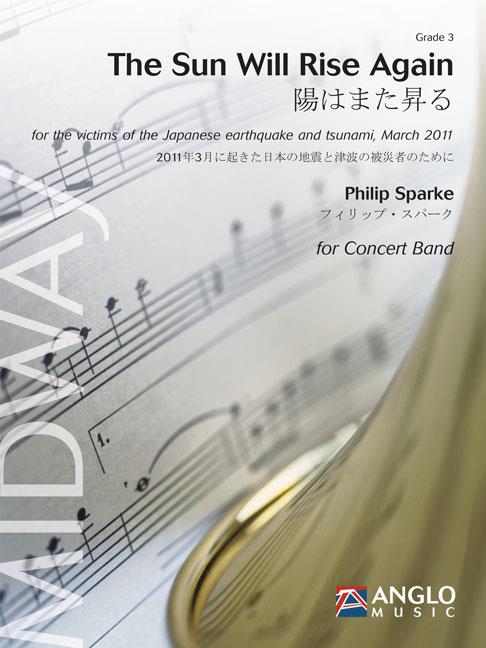Results
-
 £43.56
£43.56Maximum Mallets (Concert Band - Score and Parts)
Pure fun describes this clever mallet percussion feature! David Shaffer has once again crafted a novelty piece with clever melodies, crisp percussion writing and a thoughtful brass and woodwind accompaniment, making it a favorite of your students and audiences alike. Although written for 2 solo xylophones, the piece may be performed with multiple mallets on each part, just 1 mallet part or you can utilize any mallet instrument. Time for FUN!
Estimated dispatch 7-14 working days
-
 £37.95
£37.95CHIVALRY (Prestige Concert Band - Score only) - Ellerby, Martin
This 'Symphonic Tone Poem for Brass, Wind and Percussion' was commissioned by Philip Biggs and Richard Franklin for the 2003 All England Masters Brass Band Championship. The work transfers well to the concert band and is already being featured around the world. It is based on two principle themes of love and war which compete against each other in what can be broadly described as a cinematic structure.Performance time 14'05"Recorded on QPRM 150D CHIVALRY, Royal Northern College of Music Wind Orchestra
Estimated dispatch 7-14 working days
-
 £44.95
£44.95PARTITA for Concert Band (Darrol Barry) (Prestige Concert Band - Score only) - Barry, Darrol
This work is cast in four movements: Introit; Impromptu; Elegy (31.12.04); Finale. Grade 5. (Recorded on QPRM150D, CHIVALRY, Royal Northern College of Music Wind Orchestra) PARTITA FOR CONCERT BAND is cast in four movements: Introit - begins majestically with brass, saxes and percussion carrying the main theme from which most of the following ideas originate. It is repeated by the woodwinds and moves via a solo side drum into the piu mosso. New ideas are introduced by trombones, the horns and euphoniums leading to the central idea played by oboe. This leads, in turn, via full band to the closing movement. 2. Impromptu -once again the opening theme is the basis of the whole movement, using most of the composer's tricks, augmentation, retrograde, inversion and fugato, it moves along in a very confident style. A muted solo trumpet links into the third movement. Elegy (26/12/04) - this movement was prompted by the devastating events of Boxing Day 2004, the Asian Tsunami. The movement opens bleakly until a solo flute gives us the main theme over a troubled accompaniment. The opening mood returns but timpani and tam-tam herald return of the main theme for the full band. The opening theme is heard again as the music subsides but never settles. Finale - this spirited 6/8 vivo opens up with percussion and horns and trumpets announce the main idea, punctuated with short chords from the lower band. A new four bar theme is heard over a bass tread, the theme overlaps itself and quavers swirl up and down the band. Material from the first movement is heard transformed by the energy of the finale and the music surges towards a sudden close. Performance time: 15:35
Estimated dispatch 7-14 working days
-
 £37.95
£37.95The Year of the Dragon (Prestige Concert Band - Score only) - Sparke, Philip
The 2017 version of The Year of the Dragon was commissioned by the Siena Wind Orchestra and given its world premiere on June 17th 2017 in Bunkyo Civic Hall, Tokyo, conducted by the composer.The original wind band arrangement of The Year of the Dragon was made in 1985, a year after the composer wrote the brass band version. At that time he was still learning the intricacies of writing for wind band (and still is!) and in the 32 years which have elapsed since then, his approach to scoring for the medium has developed and, hopefully, improved.Here are the main differences between the two versions:In the 1980's, the wind band movement was much less international than it is now. British wind bands were still to some extent based on the military band tradition of the time, which tended to use rather smaller instrumentation than the then-dominant American university model. The new version embraces a much more international instrumentation, including low woodwinds and string bass, as well as an expanded percussion section.In the original version there was a touch of naivety in the way the composer wrote for the woodwinds; much of their articulation was transferred too literally from the brass version, resulting in some unidiomatic writing, which he has tried to improve in the new version.In addition to the above, Philip's own compositional style has matured and developed in the intervening 32 years. There are some passages in the original which he simply would not write today - not because they are 'wrong', but because his way of writing has changed. The new version is perhaps how he would have written it today, rather than simply dressing the original version in new clothes.The work is in three movements:Toccata opens with an arresting side drum figure and snatches of themes from various sections of the band, which try to develop until a broad and powerful theme from the middle of the band asserts itself. A central dance-like section soon gives way to the return of this theme, which subsides until faint echoes of the opening material fade to a close.Interlude takes the form of a sad and languid solo for alto saxophone. A chorale for the whole band introduces a brief spell of optimism but the saxophone solo returns to close the movement quietly.Finale is a real tour-de-force for the band with a stream of rapid semi-quavers running throughout the movement. The main theme is heroic and march-like but this is interspersed with lighter, more playful episodes. A distant fanfare to the sound of bells is introduced and this eventually returns to bring the work to a stirring close.
Estimated dispatch 7-14 working days
-
 £91.99
£91.99The Sun Will Rise Again (Concert Band - Score & Parts) - Sparke, Philip
The composer writes:On March 11th 2011 a massive 9.0- magnitude earthquake occurred off the coast of north-eastern Japan. I'm writing these programme notes barely a week later and the death toll caused by the quake and resulting tsunami already exceeds 6000, with thousands of people still unaccounted for. I have many friends associated with many bands throughout Japan and one of these, Yutaka Nishida, suggested I write a piece to raise money to help those affected by the disaster. I was immediately attracted by the idea and have arranged Cantilena (a brass band piece recently commissioned by the Grenland International Brass Festival, Norway) for wind band, giving it a new title to honour my friends in the Land of the Rising Sun. I will be donating royalties from this piece to the Japanese Red Cross Society Emergency Relief Fund and am delighted to say that my distributors, De Haske, who will generously also donate all net profits from sales of this piece, have pledged a substantial advance payment to the Red Cross so that what little help this project generates can be immediate. It is my sincere wish that this 'Band Aid' project will allow wind bands around the world support the people of Japan, where bands are a way of life for many, in this difficult time.- Philip SparkeDuration: 4:30
Estimated dispatch 7-14 working days
-
 £32.95
£32.95FANFARE TO PLANET EARTH and MILLENNIUM MARCH (Prestige Concert Band - Score only) - Fanshawe, David - Sparke, Philip
These two works may be performed individually or, as published, together. Fanfare to Planet Earth - the Fanfare opens dramatically with heraldic trumpets answered by sforzando strikes on deep percussion. The Fanfare embraces the splendour and grandeur of our planet Earth, molto grandioso, and culminates in a chordal cluster - a blaze of brass and percussion in G major, describing feelings of optimism at the start of the 21st century. Performance time 1'50". Millennium March - constructed along classical lines, the theme of Millennium March is catchy and not without humour. Its recurring motif on trumpets, con brio, develops the opening bars of the Fanfare. The March gathers momentum through several dramatic key-changes and ends with a surprise flourish of chromaticism, marked Tempo Apocalyptic. Cannons and fireworks are optional! Performance time 4'10'
Estimated dispatch 7-14 working days
-
 £49.95
£49.95Dance Movements (Prestige Concert Band - Score only) - Sparke, Philip
Score only.Dance Movements was commissioned by the United States Air Force Band and first performed by them in February 1996. A tour-de-force for a large band, the work is in four continuous movements which have dance rhythms and moods as their basis. The second movement features the woodwinds and the third is for brass. Winner of the prestigious "Sudler Award" for new music for wind band 1997.Performance time 20'30"Recorded on QPRM129D VENETIAN SPELLS, Central Band of the Royal Air Force - 'Molto Ritmico'Recorded on QPRM130D FIESTA!, Central Band of the Royal Air Force
Estimated dispatch 7-14 working days
-
 £22.95
£22.95James Cook, Circumnavigator (Prestige Concert Band - Score only) - Vinter, Gilbert - Lamb, Kevin
Originally one of the classic contest works for brass band, this evocative piece has gained life and colour in this transcription for wind band by Kevin Lamb. It depicts the vast and daring voyages of the great explorer, ending with his tragic death at the hands of natives in Hawaii.Performance time 10'50"Recorded on QPRM115D GREAT BRITISH MUSIC FOR WIND BAND, Western Band of the Royal Air Force
Estimated dispatch 7-14 working days
-
 £37.95
£37.95MUSIC FOR AROSA (Prestige Concert Band - Score only) - Sparke, Philip
This work was commissioned in 1996 by the Arosa Cultural committee and first performed in Arosa in that year. The majestic introduction opens with trombones and euphonium, heralding a legato theme, chorale-like in character. A pair of flutes introduce a new theme. A trumpet introduces a series of highly syncopated solos, which feature many metre changes, and the tempo increases when playful motifs are exchanged between various sections of the band. A solo clarinet introduces an expressive tune. A brass chorale follows, with interruptions from the flute and bassoon, until the clarinet tune is played by the whole band. This reaches a climax and the mood subsides to reach a quiet horn chord. The broad legato tune returns and the excitement increases until the march theme triumphantly returns to full band. This leads to the coda which is based on the opening fanfare and closes the work emphatically. (Grade 5) Performance time 11'01" (Recorded on QPRM138D BREAKING THE CENTURY, Central Band of the Royal Air Force)
Estimated dispatch 7-14 working days
-
 £32.95
£32.95Tristan Encounters (Prestige Concert Band - Score only) - Ellerby, Martin
This work is subtitled Prelude and Transfigurations for Brass, Wind and Percussion. It is derived from Wagner's Prelude to his opera Tristan and Isolde and consists of a series of tableaux-mood pictures which alternate between a romantic idiom and tritone-style aggressive music. The work is cast as a prelude and ensuing set of fourteen variations and is meant to be played as a continuous piece.Grade 5Performance time 16'25''Recorded on QPRM152D MOSAIC: Great British Music for Wind Band Vol.13 (Royal Northern College of Music Wind Orchestra)
Estimated dispatch 7-14 working days
